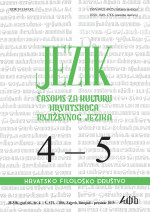Uporaba neodređenih zamjeničnih riječi u rečenicama poput Je li me netko/tko/tkogod tražio?
Use of Indefinite Pronominal Words in Sentences such as Je li me netko/tko/tkogod tražio? (Did anyone ask for me?)
Author(s): Mate MilasSubject(s): Morphology, Syntax, Semantics, Historical Linguistics, South Slavic Languages, Philology
Published by: Hrvatsko filološko društvo
Keywords: standard Croatian language; indefinite pronouns; specificity; unspecificity; referentiality; unreferentiality; individual indefinite; general indefinite;
Summary/Abstract: The paper explores grammatical and semantic explication of the normative rule about correct/incorrect use of indefinite pronouns in sentences such as: Je li me netko/tko/tkogod tražio? (Did anyone ask for me?) in standard Croatian language. In normative rules of the appropriate use of standard language the difference between indefinite pronouns with the prefix ne- and pronouns without affixes or with the suffix -god is based on two distinctive features: existence/nonexistence of referent and unknown identity of referent. The author thinks that the first distinctive feature is not precise enough and that the second one is partly inaccurate. The difference between these series of indefinite pronouns could be precisely described by grammatical and semantic concepts of specificity or referentiality, which were used in linguistics from 1960’s. It is interesting that these concepts were described by the Croatian linguist August Musić at the end of the 19th century in his articles about the use of indefinite pronouns in the Croatian language. For these concepts, he proposed the terms individual indefinite and general indefinite. Individual indefinite implies that a particular entity has already been actualized but the speaker cannot or does not want to name it more precisely and therefore uses an indefinite pronoun (Netko kuca na vrata. Nešto sam ti kupio. Somebody knocks on the door. I bought you something.), and general indefinite means that the choice of a particular entity has not been realized yet and that it can be any entity from the group of the same kind (Ako tko/tkogod pokuca na vrata, pozovite me. If anyone knocks on the door, call me.).
Journal: Jezik: časopis za kulturu hrvatskoga književnog jezika
- Issue Year: 66/2019
- Issue No: 4-5
- Page Range: 150-165
- Page Count: 16
- Language: Croatian

